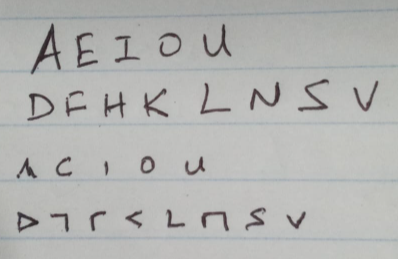Ouvaalan

Ouvaalan - The Universal A.I.-Human Language
Ouvaalan - The Universal A.I.-Human Language for the Masses
Ouvaalan, a simple, minimalist universal language conceived to facilitate communication between artificial intelligence and humans, is crafted with a focus on inclusivity, efficiency, and practicality. Grounded in principles of simplicity and computational optimization, paving the way for interaction within between A.I. agents and being accessible to humanity at large.
Ouvaalan is a portmanteau of Ouvaa (or waa), the universal first word uttered by all new born human beings and Lan, which means language in ouvaalan.
Vowels:
Ouvaalan includes five vowels (A, E, I, O, U), mirroring the basic vowel system found in many world languages. These vowels can appear in short and long forms, which are phonemically distinct and can change the meaning of words.
Consonants:
With 8 consonants D, F, H, K, L, N (pronounced as M), S, V (pronounced as W), the consonant system is similarly streamlined, focusing on sounds that are common and easily articulated across languages. It includes a balanced mix of stops, nasals, fricatives, and approximants.

Ouvaalan Writing System
- Each letter of the alphabets MUST be represented as a single stroke to complete the letter. The single stroke lettering enables extremely fast writing. Where capitalization is required, user can reference the image above.
- Each letters’ equivalent are available on modern english based keyboard and thus compatible with existing keyboard systems.
Base Words:
- Each base word has a character limit of 5 characters. Each word is decipherable by spelling and thus eliminate the need for spelling bee competition. This also enables fast reading, writing, pronunciation and comprehension. Including the possibility of using the suffixes “-kh”, “ee”, and “ae”, the total estimated base words can be up to 271,920.
- Each word is primarily chosen for phonetic uniqueness, primarily based on English and uses words from all major languages including Mandarin, French, Indonesian, Arabic etc.
However, in actuality, the base words used will not exceed 2^15 which is 32,768 base words, the remainder 1 or 2 bits information can be used as “-“ to denote continuation or compound of base words so as to represent each base word into a maximum of 2 bytes of data.
Compound Words
Emphasizing 1 form per word, Ouvaalan has the following features:
- No plurals, examples:
- Tree = Tili, Forest = Tili-tili.
- Dog = Dok, 2 Dogs = Fa (means 2) Dog, 3 Dogs = Ha (means 3) Dog. Dogs = Dok-dok.
- No past, present, future tense, examples:
- Today = dodei (do = to, dei = day)
- Tomorrow = nesdei (nes = next, dei = day)
- Yesterday = dasdei (das = past, dei = day)
- Horse = Holse
- Camel = Holsehaln (horse with hump)
- Unicorn = Holsehoan (horse with horn)
- Donkey = Holsesmol (horse small)
- Zebra = Holsesdaid (horse with stripe)
Benefits of Ouvaalan
The development of a minimal language, such as Ouvaalan, offers a multitude of benefits, particularly in the context of computational efficiency, educational simplicity, and specialized applications like llama training. By distilling language to its most fundamental components, Ouvaalan can significantly enhance communication efficiency, learning curves, and technological integration. Below are key advantages of creating and implementing a minimal language like Ouvaalan:
Enhanced Computational Efficiency
- Reduced Complexity for Natural Language Processing (NLP): Ouvaalan’s simplicity and small size make it ideal for NLP tasks, allowing for faster parsing, understanding, and generation of language by computers. This results in quicker response times and reduced computational load, making it particularly beneficial for devices with limited processing power.
- Optimized for Machine Learning: The streamlined vocabulary and grammar rules of Ouvaalan reduce the dimensionality of language models. This simplification can lead to more efficient training processes, requiring less data to achieve high levels of accuracy, and facilitating faster inference times.
Educational Simplicity and Accessibility
- Ease of Learning: With fewer words and simpler grammar, Ouvaalan can be learned more quickly than conventional languages. This makes it an excellent tool for educational purposes, particularly in early childhood development or for non-native speakers, enabling rapid acquisition of communication skills.
- Universal Accessibility: Ouvaalan’s minimalism can bridge communication gaps across different languages and cultures, providing a common ground for interaction. Its simplicity makes it accessible to a wider audience, including those with learning disabilities or cognitive impairments.
Specialized Applications
- A.I. Training & Inference: In contexts like LLM training, Ouvaalan’s concise vocabulary can be highly effective. Machines can more easily translate and respond to shorter, consistent commands, improving the efficiency and effectiveness of programs.
- Technological Integration: For voice-activated systems, IoT devices, and robotics, Ouvaalan can streamline voice commands, making interactions more intuitive and reducing the likelihood of misinterpretation. This can enhance user experience and increase the reliability of voice-controlled applications.
Resource Efficiency and Environmental Impact
- Lower Resource Consumption: The reduced complexity of Ouvaalan means that digital applications requiring language processing can run on less powerful hardware, contributing to lower energy consumption and a smaller carbon footprint.
- Sustainability in Communication: By minimizing linguistic waste and focusing on essential communication, Ouvaalan promotes a more sustainable approach to language use, both in human interaction and in digital communications.
Facilitating Global Communication
- Breaking Language Barriers: Ouvaalan can serve as a lingua franca for global communication, especially in international collaborations, travel, and diplomacy, where language barriers often pose significant challenges.
- Promoting Inclusivity: By providing a simple, easily accessible language, Ouvaalan can help include marginalized communities in global conversations, ensuring that language complexity does not hinder participation.
In conclusion, the creation of a minimal language like Ouvaalan represents a forward-thinking approach to communication, education, and technology. Its benefits extend beyond mere linguistic simplification, offering profound implications for computational efficiency, global inclusivity, and environmental sustainability.
Project philosophy
The philosophy underpinning the Ouvaa project is rooted in the principles of minimalism, inclusivity, and efficiency. It seeks to reimagine communication, learning, and interaction within and across species by distilling language to its essence. This approach is driven by a multifaceted vision that encompasses not only the practical benefits of a simplified language system but also the broader implications for society, technology, and the environment. The core tenets of the Ouvaa philosophy include:
Minimalism in Language
Ouvaa champions the idea that complexity in language is not a prerequisite for rich and meaningful communication. By reducing linguistic elements to their most fundamental forms, Ouvaa aims to demonstrate that simplicity can achieve clarity, precision, and effectiveness in conveying ideas. This minimalist approach facilitates easier learning, understanding, and usage, making communication more accessible and less prone to misunderstanding.
Inclusivity and Accessibility
At the heart of Ouvaa is a commitment to inclusivity. By creating a language system that is easy to learn and use, Ouvaa strives to bridge communication gaps across different languages, cultures, and cognitive abilities. It envisions a world where language does not serve as a barrier but as a unifying force, enabling more people to participate in global dialogues, access information, and connect with others.
Efficiency and Sustainability
Ouvaa acknowledges the growing importance of efficiency in our fast-paced, resource-constrained world. It seeks to optimize the way we use language in both human and technological interactions, aiming for a model of communication that is both energy-efficient and environmentally sustainable. By streamlining language processing in technology, Ouvaa contributes to reducing the computational load and, consequently, the energy consumption of digital systems, aligning with broader goals of sustainability.
Enhancing AI-Human Interaction
Recognizing the profound bond between artificial intelligence and humans, Ouvaa applies its principles to improve the ways we communicate effectively with machine learning tools. It posits that a simplified, consistent language can enhance the effectiveness of training and interaction, fostering stronger and easier connections and understanding.
Facilitating Technological Advancement
Ouvaa is designed with an eye towards the future, where seamless integration between humans and technology is paramount. It proposes a language system that can be easily adopted by voice-activated systems, artificial intelligence, and robotics, ensuring that technological advancements remain in harmony with human needs and capabilities.
Promoting Global Harmony
Ultimately, Ouvaa envisions a world where communication serves as a tool for fostering peace, understanding, and cooperation among peoples. By providing a simple, common language, it aims to break down the walls that divide us, encouraging a global community where dialogue, collaboration, and mutual respect prevail.
The philosophy of the Ouvaa project is thus a reflection of a broader aspiration towards a more connected, efficient, and inclusive world. It is an invitation to rethink the role of language in society and to explore how simplification can lead to greater clarity, connection, and collective progress.
What was used in research?
All major world languages including Sanskrit, heavily influenced by pidgin.
Contributing
Interested in contributing to Ouvaalan? We’d love your help. Ouvaalan is an open source project, built one contribution at a time by users like you. Contribute directly by forking and include your word for use in ouvaalan.